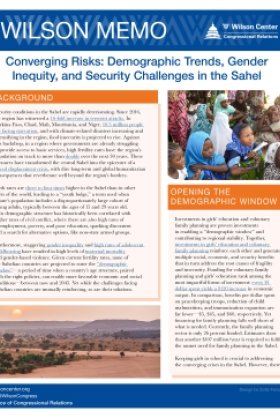Wilson Memo | Converging Risks: Demographic Trends, Gender Inequity, and Security Challenges in the Sahel




Security conditions in the Sahel are rapidly deteriorating. Since 2016, the region has witnessed a16-fold increase in terrorist attacks. In Burkina Faso, Chad, Mali, Mauritania, and Niger, 10.5 million people are facing starvation, and with climate-related disasters increasing and intensifying in the region, food insecurity is projected to rise. Against this backdrop, rapid population growth is outpacing governments’ ability to provide access to basic services. These pressures have transformed the central Sahel into the epicenter of a forced displacement crisis, with dire long-term and global humanitarian consequences that reverberate well beyond the region’s borders.
The Wilson Memo, "Converging Risks: Demographic Trends, Gender Inequity, and Security Challenges in the Sahel," summarizes key findings from a recent Wilson Center's policy brief and was informed through conversations held with Congressional Staff. The memo examines the converging security challenges currently facing the Sahel region, and explains how investing in girls' education and voluntary family planning can enable a "demographic window" and contribute to overall regional stability. It further provides insight on how the United States can build upon its prior investments in the region and take a leadership role in encouraging the international community to leverage contributions towards increasing investments in women and girls.
Read the full memo by clicking the download link above.

Congressional Relations
The Wilson Center’s office of Congressional Relations works to maintain a vibrant relationship with Members of Congress and their staffs. We organize and run a series of educational programs led by Wilson Center experts, ranging from seminars to private briefings, with the purpose of increasing congressional staffers’ knowledge of foreign policy. We also coordinate outreach to Capitol Hill, including testimonies by Wilson Center scholars and briefings specifically for Members of Congress. Read more


Environmental Change and Security Program
The Environmental Change and Security Program (ECSP) explores the connections between environmental change, health, and population dynamics and their links to conflict, human insecurity, and foreign policy. Read more


Maternal Health Initiative
Housed within the Wilson Center's Environmental Change and Security Program, the Maternal Health Initiative (MHI) leads the Wilson Center’s work on maternal health, global health equity, and gender equality. Read more

Explore More
Browse Insights & Analysis
360° View of How Southeast Asia Can Attract More FDI in Chips and AI

A Case for a North American Common Tariff

